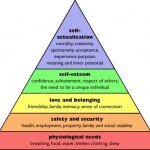Your Career Hierarchy of Needs
Famed psychologist and researcher Abraham Maslow is best known for his theory of motivation, which is based on the idea that people also have strong cognitive reasons to perform various actions. In his well-known hierarchy of needs, Maslow presents different motivations at different levels. This is often represented as a pyramid.
First, people are motivated to fulfill basic biological needs for food and shelter, as well as those of safety, love, and esteem. These are the base of the pyramid and serve as the foundation of existence. Once the lower level needs have been met, the primary motivator becomes the need for self-actualization, or the desire to fulfill one's individual potential. People who have obtained self-actualization typically have some common qualities, including the ability to see life more clearly and to put others’ needs before their own. They also share other qualities, including a well-developed or even quirky sense of humor, a distinct need for solitude, spontaneity and high levels of acceptance of both themselves and others. Maslow postulated that only 1 in 100 of us will ever truly reach the top of the pyramid and become fully self-actualized. Nonetheless, self-actualization is something for which most of us strive.
Maslow’s pyramid provides us an excellent framework by which to live our lives, and also by which to help identify, define, refine, and organize our career goals. At the base of the career pyramid of needs is the main reason we all go to work—we need to survive. We must have food to eat, access to safe drinking water, and proper shelter. Safety and security needs, within the context of your career, means that you are earning enough money, you have accommodating benefits, and that you have a safe workplace. Love and belonging translates into teamwork, mentorship, and a sense of acceptance from co-workers. Self-esteem is knowing that your work matters and becoming an expert at what you do.
 Finally, self-actualization in your career results in peak performance and experiences, and make you a better contributor, employee, and member of society. As Maslow theorized, very few of us will achieve self-actualization in our careers. However, in order to have a meaningful career, it is something to which we should all aspire. How do we attempt to scale the pyramid to reach the pinnacle?
Finally, self-actualization in your career results in peak performance and experiences, and make you a better contributor, employee, and member of society. As Maslow theorized, very few of us will achieve self-actualization in our careers. However, in order to have a meaningful career, it is something to which we should all aspire. How do we attempt to scale the pyramid to reach the pinnacle?
Be honest in your choices and operate with integrity. Honesty is key to integrity, and no one wants to work with someone who lacks either. Integrity builds trust, which is essential to having a successful career.
Experience the world fully. Be open-minded, and not a stickler for rules. People who operate by the mantra of “my way or the highway” tend to be poor leaders, because they are stuck at the safety and security level.
Recognize your uniqueness. Also, surround yourself with unique people. Everyone’s experiences are different, and they all come together to shape their own unique perspectives. This is exceptionally valuable.
Take risks. Some of the best innovation comes out of failure. Failure is one of the best teachers and motivators we have. Without ever risking failure, you will never achieve success.
Seek constant improvement and change. Self-actualization is not a static state. It is a process that is constantly evolving. Doing the same thing will get you the same results. Switch things up.
Reduce ego defense. Let go of defense mechanisms and let in new ideas and new ways of doing something. Seek out critical feedback.

